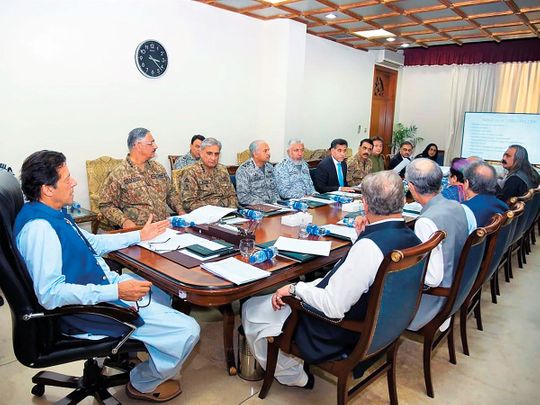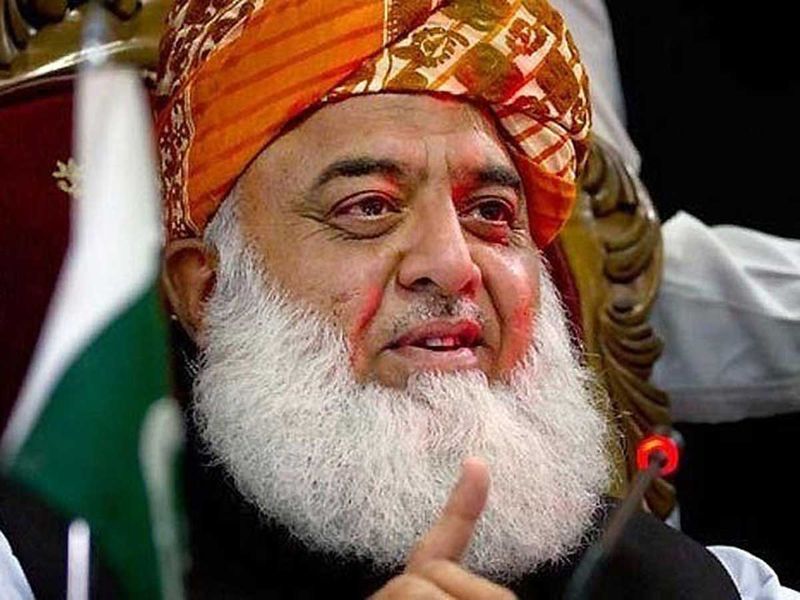
Pakistan’s opposition politician Maulana Fazlur Rehman’s promise to storm the capital city, Islamabad, on 31 October in an antigovernment protest carries a hollow ring. And the demand for prime minister Imran Khan to immediately resign and take the country towards fresh parliamentary elections, has only exposed the opposition’s inability to sensibly think through its course of action.
Historically, Rehman has been associated with groups which have supported ‘jihad’ or holy war consistently over time. In contrast however, there is no evidence of his active participation in public causes such as reforming the economy which today remains challenge number one for Pakistan. In this background, its hard to take Rehman seriously as he promises to remove Khan as Pakistan’s prime minister.
Coming just over a year after the last parliamentary elections of 2018, Rehman’s demand for Khan’s removal and fresh elections, is just not the point. No matter how incompetent the government of the day must be, there is no justification for anyone to abruptly demand premature elections till such time that parliament votes to do so.
In other words, the motto ‘my way or no way’ appears to have been coined for politicians like Rehman as he seeks to turn the tables on the prime minister.
While the ruling Pakistan Tehreek e Insaf or PTI led by the prime minister has promised to tackle the ever growing challenge of abject poverty, the government’s failure in other areas is much too visible to be ignored
For the moment, Pakistan needs to embrace and continue along a reformist path to turn around its battered economy and internal system of governance. For years, Pakistan’s performance in key areas of the economy has trailed behind the country’s peers in other parts of the world, making it impossible to take Pakistan out of a cycle of ever widening poverty.
Politicians across the board have shown little determination to begin tackling this very sorry and unending trend. As a consequence of this slide, key public services in areas like health care, education and affordable housing for the poor have become a sorry joke.
In the midst of this unsustainable slide downwards, prime minister Khan’s government in power for over a year must also take responsibility at least for its failure to set the course for a better future.
While the ruling Pakistan Tehreek e Insaf or PTI led by the prime minister has promised to tackle the ever growing challenge of abject poverty, the government’s failure in other areas is much too visible to be ignored.
Consequently, it’s not surprising that anecdotal evidence suggests rapidly growing popular frustration with the ruling structure than witnessed in recent memory with other regimes.
While Rehman’s decision to enter the warpath with Khan’s government is off the mark, the ruling structure must also be made accountable for its own failures. Pakistan’s economy today has slowed down to levels that are clearly even below the population growth. Arguably, this is net terms marks negative economic growth than positive.
Economic woes
Meanwhile, key areas of the economy continue to suffer badly. For instance, agriculture remains the main component of Pakistan’s economic growth cycle. But the failure to translate ambitious claims in to progress on the ground literally means that more than half of Pakistan’s population which is directly or indirectly dependent on farm incomes, has been sidelined.
The province of Punjab which is home to about 60 per cent of Pakistan’s population, also remains the country’s essential bread basket and the main source of agricultural output. Here, the provincial administration of chief minister Usman Buzdar performs dismally.
Meanwhile, the prevailing crisis over this years’ unprecedented spread of the dengue virus in the Punjab, says much about the failure of the Punjab government to take timely steps for prevention of this curse. Its therefore not surprising that former chief minister Shehbaz Sharif who now leads the opposition Pakistan Muslim League-Nawaz or PML-N is being widely remembered as the provincial leader who led the attack against dengue from the front.
Elsewhere too, the crisis of governance under Khan continues to witness one example of mediocrity after another, among ministers in his cabinet. But a long awaited promise of a shake up to rid the cabinet of the proverbial rot, is yet to come. Its therefore not surprising that popular faith in Khan’s ability to either be a judge of performance related character or leading from the front, has fallen in doubt.
Meanwhile, the government continues to proudly show off its success on the foreign policy front, ranging from publicising conditions inside Indian administered Kashmir which has been under a fierce lockdown, to seeking mediation between Iran and Saudi Arabia. Though these are worthwhile causes, the acutest challenge surrounding Pakistan today must only relate to the internal front.

Going forward, irrespective of how Rehman’s promised protest turns out, its high time for Khan and his ruling structure to consider how well or not they are performing. Ultimately, the ruling structure will be recognised by the Pakistani public for their own performance rather than the opposition led by people like Rehman.
The very fact that Rehman has gained widespread notice though he has been no more than a side player in Pakistan’s politics, says much about the government’s performance.
With or without the protest planned for 31 October, its high time for Pakistan’s prime minister to take charge of the country in key areas, lying unattended in spire of his bold promises.
— Farhan Bokhari is a Pakistan-based commentator who writes on political and economic matters.











